Technical Notes - e1
![]() Gold Standard Search - e2
Gold Standard Search - e2
NLM Classification, 5th Edition Additions and Changes List 3 - e3
Gold Standard Search
Thank you to everyone who mailed in search strategies in response to the last Gold Standard Search article in the July-August 1998 issue of the NLM Technical Bulletin. This is the last installment of this column, which offers searchers a chance to match wits with NLM staff on a search strategy formulation using PubMed or Internet Grateful Med (IGM). The Gold Standard search strategies are developed here at NLM. The search request published in the July-August 1998 issue was:
The consequences of repeated weight loss and weight gain with dieting.
The Winner
Joanne Johnson, Reference Library of the Laboratory Centre for Disease Control Library of Ottawa, Ontario was the winner of this search and Cheryl Banick of Warwick, Rhode Island, winner of the January-February contest, was this month's runner up. Both searchers did an excellent job and although they came at the search from different directions, they ended up with similar results.
Introduction to the Search
This search was selected to illustrate searching for a concept for which there is no exact match in the MeSH vocabulary. Ms. Johnson initially related the concept of repeated weight loss and weight gain with the popularly used phrase 'yo-yo dieting' and ran a PubMed search on this phrase. The citations retrieved lead her to the term "weight cycling" which retrieved the bulk of the relevant articles. Ms. Banick started off her search using MeSH headings and that retrieval also lead her to the term weight cycling which she then included in her search to produce most of the relevant retrieval. The Gold Standard Search also started with the term yo-yo dieting and then searched on the phrase 'weight cycling' and then used PubMed's See Related Articles link to find additional relevant citations.
Choosing a File
The subject of this search, weight loss, should suggest MEDLINE as the file to search. The subject is a concept that would be covered in the over 3,900 journals currently indexed for MEDLINE. If you use PubMed or IGM as your search engine, and do not limit your search to MeSH headings, then you will also retrieve citations from PREMEDLINE and there would be no need to look in any of the other files available on the Web for the current journal information on this subject. All searches for this subject were run using the PubMed search engine.
Analysis of the Search Strategies
Ms. Johnson and the Gold Standard Search both began by searching on the phrase "yo-yo dieting." See Figures 1, 2 and 3 for examples of the term entered, the retrieval obtained and the Details box showing the way the phrase was actually searched. You see the Details box displayed when you click on the Details button shown in Figure 2. Please note that the citation shown in Figure 2 is truncated; the PMID and the UI could not be displayed because of sizing restraints in the software used to capture the image.
Figure 3 (the Details display) shows the phrase yo-yo being searched in All Fields and ANDed together with the word 'dieting' in All Fields. When PubMed did not find the phrase "yo-yo dieting" as a MeSH heading or journal title, it searched its phrase list where it did find the phrase 'yo-yo'. For a more complete explanation of PubMed's translation tables go to PubMed Help and click on Automatic Term Mapping (http://www.ncbi.nlm.nih.gov/sites/entrez?db=Books&cmd=Search&term=automatic%20term%20mapping%20AND%20helppubmed%5Bbook%5D&doptcmdl=TOCView).
Ms. Johnson's Search Strategy
Ms. Johnson looked at her retrieval and noticed that the term weight cycling appeared in the most relevant articles. She then added this term to her strategy as shown in Figure 4 and limited to English for her final retrieval. She concluded that the addition of MeSH terms would produce too many irrelevant articles. Note the use of quotation marks around the phrase "weight cycling" in Figure 4. The double quotes force PubMed to look in its compound word dictionary and because the phrase is there, PubMed does not AND the individual words together and does not look for the phrase as a MeSH heading. Using double quotes turns off Automatic Term Mapping. However, if PubMed didn't find the phrase inside the double quotes, then it would disregard the quote marks and use the regular Automatic Term Mapping procedures to search for the phrase. For more information from PubMed Help on Phrase searching go to:
http://www.ncbi.nlm.nih.gov/sites/entrez?db=Books&cmd=Search&term=phrase%20searching%20AND%20helppubmed%5Bbook%5D&doptcmdl=TOCView. Also note that to limit to English language citations, the three letter phrase plus the language qualifier may be used, e.g., eng [la] as shown in Figure 4.
Figure 1 - PubMed Search on Phrase "yo-yo dieting"
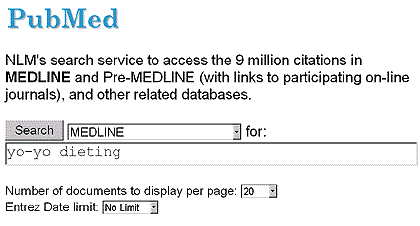
Figure 2 - Citation 1 of 13 Retrieved
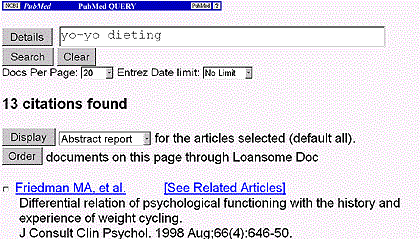
Figure 3 - Details Box Displaying the Search Strategy
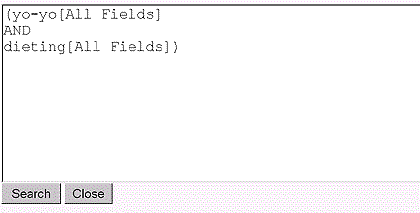
Figure 4 - Ms. Johnson's Final Search Strategy
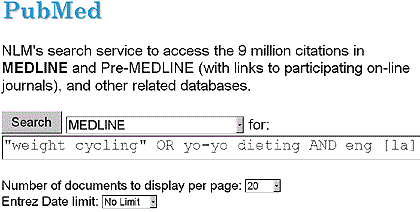
Ms. Banick's Search Strategy
Ms. Banick began her search by looking in the MeSH browser for subject headings related to the search topic and then searching on several of them including: Diet Fads; Diet, Reducing; Weight Loss: and Body Weight Changes. She searched these concepts as the main concepts in the articles by qualifying the terms with [majr] and combined them with the subheadings Adverse Effects and Physiology. Please note if that if you follow this procedure you are eliminating all PREMEDLINE citations because they will not yet be indexed with MeSH headings.
It is fine to use the MeSH browser to suggest the terms available, but in your final strategy, if you want to include the most recent citations, type in the MeSH headings without any qualification. If you select your terms from the MeSH browser, by clicking on Add to Query, then you will only retrieve articles that have been indexed with MeSH headings and you will not retrieve the most recent articles added to the database. If after examining the headings in the MeSH browser, you click on the PubMed button in the top bar of the browser screen, you will return to the basic search screen where you may type in the MeSH headings. You may also copy the MeSH headings from the browser and then paste them into the box on the basic search screen. Then PubMed will search them not only as MeSH headings but also as Text Words. Figure 5 shows the MeSH browser screen. You get there by clicking on MeSH Browser in the sidebar of the PubMed homepage. If you enter the term weight and click on Browse you will see the screen shown in Figure 6. If you then select Weight Loss and click on Browse This Term, you will see the screen shown in Figure 7, displaying the tree for the selected term. By scrolling through the display and clicking on the relevant terms, you can see their definitions and tree structures and decide whether or not to include them in your search.
Figure 5 - Entering the Word "weight" in the MeSH Browser
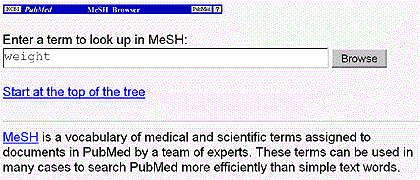
Figure 6 - MeSH Browser Display for "weight"
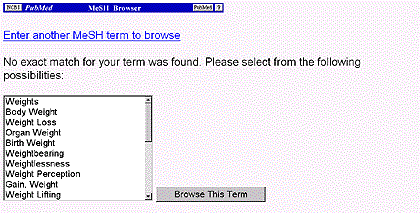
Figure 7 -MeSH Browser Display for "Weight Loss"
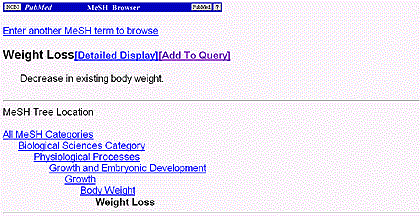
After looking through the retrieval from various MeSH headngs, Ms. Banick noticed that the best citations contained the phrase "weight cycling" and added that to her search strategy of MeSH headings. Ms. Banick selected two MeSH headings and the phrase weight cycling for her final search strategy as shown in Figure 8. She also limited to English and human [mh]. Figure 8 is taken from the PubMed Search Details screen.
Figure 8 - Ms. Banick's final search strategy
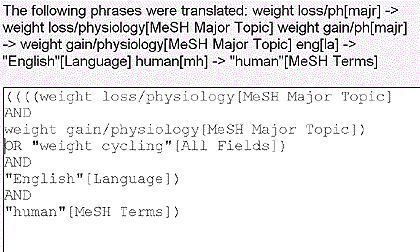
Gold Standard Search Final Strategy
The Gold Standard Search started off like Ms. Johnson's search with the phrase yo-yo dieting and then also recognized that the term "weight cycling" was appearing in the citations that were most relevant. So that phrase in quotations was added to the search strategy. The retrieval from this expanded strategy was examined to see if there were any additional MeSH headings that might be added to increase relevant retrieval. You can click on the Abstract report box and select Citation report or MEDLINE report from the Brief Display screen shown in Figure 2 and then click on Display to see the MeSH headings. The MeSH headings used on examined citations were not precise enough to exactly capture the concept of weight cycling. They included: Obesity/psychology; Weight Gain; Weight Loss; Body Weight; Diet, Reducing; and others, but all these would broaden the search beyond the range of relevant retrieval.
Returning to the Brief Display screen, the Gold Standard search clicked on the See Related Articles link (shown in Figure 2) next to a few of the most highly relevant citations. This allowed the Gold Standard Search to find articles that did not have the terms weight cycling or yo-yo dieting but were still relevant to the original concept of the search. These citations contained phrases such as: weight regain; repeated weight loss; dieting history; and subsequent weight loss. See Figure 9 for two sample citations retrieved from the See Related Articles link from the Friedman MA citation shown in Figure 2.
Figure 9 - Additional Citations Retrieved Using the See Related Articles Link


See Related Articles
The See Related Articles feature is a powerful tool; it uses a sophisticated algorithm to determine the relatedness of citations and it can find additional relevant retrieval when using the MeSH headings would cast too broad a net. While the See Related Articles link is not a strategy in the traditional sense of figuring out the terms to search and keying them in to retrieve more citations, it works the same way to expand your retrieval. With just a click of the mouse, you can expand a small retrieval to include other relevant citations without even needing to know the MeSH headings used to index them.
The citations in Figure 9 were selected because they do not have any of the phrases that were used in the original search strategy. And their MeSH headings are diverse enough so that one strategy would not easily retrieve these two citations without also retrieving quantities of irrelevant material. The See Related Articles is one of PubMed's most powerful features; don't forget to use it.
There was one person who entered a strategy that consisted of the following words: consequences repeated weight loss gain diet. This strategy retrieved two citations and the first one contained the phrase weight cycling. By clicking on the See Related Articles feature he would have retrieved 128 citations, most of them highly relevant. However, this person did not do that and so 2 was his final retrieval. Even the most rudimentary strategy, so long as it retrieves a single relevant citation can lead to a reasonable retrieval with a click on See Related Articles.
Comparison of Retrieval
Ms. Johnson's search retrieved 110 citations, 33 of which were not in Ms. Banick's retrieval. Ms. Banick's search found 92 citations, 17 citations of which were not in Ms. Johnson's retrieval. (These figures represent searches done in early November.) There were more relevant citations in Ms. Johnson's unique retrieval than in Ms. Banick's. A typical user would probably have been satisfied with either search. The decision to limit to human would have to be based on the searcher's interpretation of what would be relevant for the person who requested the search. There was nothing explicit in the wording of the original request that would make this necessary.
The Gold Standard Search retrieved the same 110 citations as Ms. Johnson's strategy, plus as many of the citations using the See Related Articles feature as the searcher wanted to include.
Closing Comment
As noted in the Gold Standard article in the July-August 1998 issue of the NLM Technical Bulletin, this article is the last one in this series. The low response rate to the Search contest has played a part in this decision. A Search Hints feature will continue in the tradition of the Gold Standard Search to provide you with information that will highlight particular system features. It has been my pleasure and privilege to review the searches and cover this feature over the years that it ran. Reading your responses was an education and helped me more clearly understand what search features needed to be covered in these articles. I learned as much as I taught. If you have any questions or comments about the NLM Technical Bulletin and the new Search Hints feature, please contact us at mms@nlm.nih.gov.
- --prepared by Toby Port
- MEDLARS Management Section
